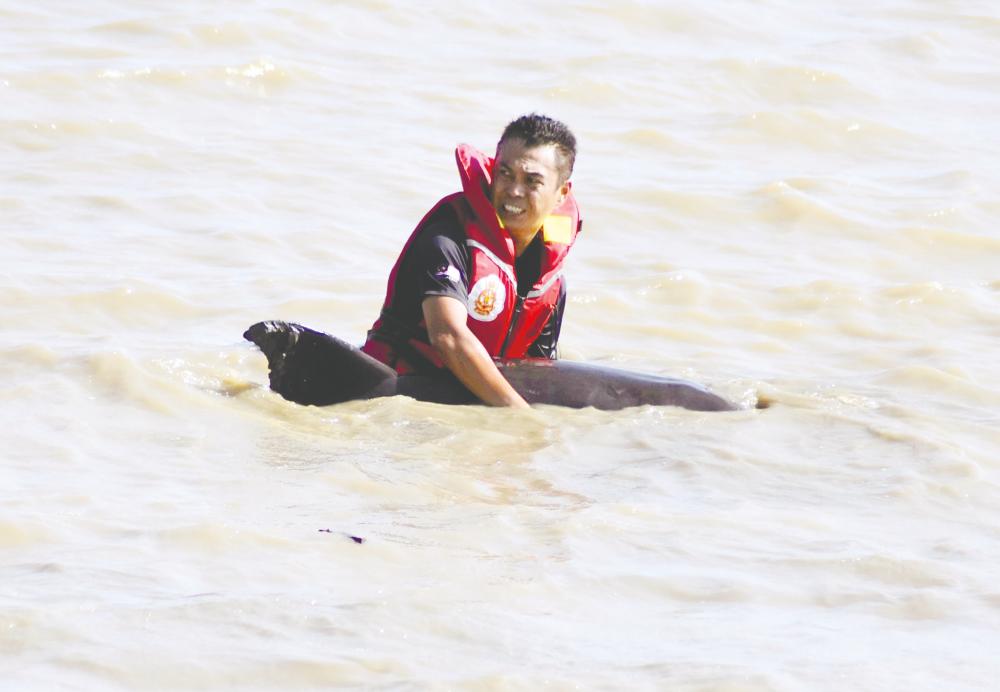PETALING JAYA: Malaysia needs to urgently implement a “boating code of conduct” to protect dolphins and other endangered mammal species before more of them wash up dead on our beaches, said a marine research and conservation NGO that studies mammals to enhance conservation and increase public awareness.
MareCet Research Organisation outreach and education coordinator Aizatul Jasmine Azizan said protecting the mammals requires urgent action to manage marine traffic.
“Implementing such a code of conduct for dolphins is important, especially in their hotspots such as Perlis, Kedah and Langkawi Island, where tour boats, ferries and shipping vessels are prevalent.
“The code of conduct would introduce safety measures like speed limits in high-risk areas, helping to reduce threats like noise pollution, collisions and boat strikes.”
Additionally, she called for the establishment of protected areas in core marine mammal habitats and protected corridors.
She was commenting on an incident on Nov 10 in which a dolphin carcass was found on Teluk Bahang beach in Penang. It is believed to have died from injuries possibly caused by a ship collision, breaking free from a fishing net or while hunting for food in shallow waters.
Aizatul Jasmine said it has become increasingly common for carcasses to wash up on shores, including those of dolphins, porpoises and even dugongs (sea cows). At least three cases are reported annually, with many others going unreported.
She said one of the primary threats to dolphins is being caught as “bycatch”, in which accidental entanglement in fishing nets results in serious injuries or even death.
“Dolphins often target the same fish that fishermen are after, so they may try to catch fish already trapped in the nets or simply feed in their natural grounds, which overlap with active fishing zones.
“The impact goes beyond individual dolphins, as these incidents can affect their overall population and disrupt the balance of marine ecosystems.”
Aizatul Jasmine said public and stakeholder support is critical, adding that nine out of 10 Malaysians are unaware that dolphins inhabit Malaysian waters.
University Putra Malaysia Department of Biology marine biologist Dr Wan Mohd Syazwan Wan Solahudin said public awareness about endangered species such as dolphins is relatively low, especially in rural coastal areas where the direct impact of marine conservation is less visible.
“Fishermen and boat operators should also be trained to report dolphin sightings and strandings while learning to avoid harmful practices that threaten their survival.
“Additionally, promoting dolphin-watching tours as a sustainable and eco-friendly activity can raise awareness and provide an economic incentive for conservation.”
Wan Mohd Syazwan said dolphins in Malaysian waters are highly threatened by human activity, with plastic waste and chemical pollutants posing serious risks to their health and reducing their ability to thrive in marine environments.
“As top predators, losing even one dolphin can throw the ecosystem off balance by allowing their prey numbers to grow unchecked.
“This can harm other species that are lower in the food chain and disrupt their hunting efficiency and reproductive success. In the long run, it could be harmful to dolphin biodiversity.”
Wan Mohd Syazwan said while it is important to assist stranded or injured mammals, individuals should avoid approaching or touching them as this could cause further stress or injury.
“Immediately contacting the nearest fisheries authorities or active NGOs for assistance is best as under Malaysian law, marine mammals including dolphins are protected under Section 27 (3) of the Fisheries Act 1985.”
The Act states that they are not allowed to be fished, disturbed, touched, captured, killed or taken. Offenders face a fine not exceeding RM5,000.









